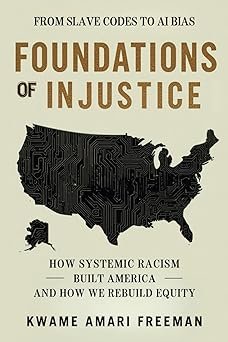The Plunder of Black America: How the Racial Wealth Gap Was Made 2025
The long history of the racial wealth gap in America told through the stories of seven Black families who struggled to build wealth over multiple generations
Wealth is central to the American pursuit of happiness and is an overriding measure of well-being. Yet wealth is conspicuously absent from African American households. Why do some 3.5 million Black American families have zero or negative wealth?
Historian Calvin Schermerhorn traces four hundred years of Black dispossession and decapitalization—what Frederick Douglass called plunder—through the stories of families who have strived to earn and keep the fruits of their toils. Their struggles reveal that the ever-evolving strategies to strip Black income and wealth have been critical to sustaining a structure of racialized disadvantage. These accounts also tell of the quiet heroism of those who worked to overcome obstacles and defy the plunder.
From the story of Anthony and Mary Johnson, abducted from Angola and brought to Virginia in 1619, to the enslaved Black workers dispossessed by the Custis-Washington family, to Venture Smith (born Broteer Furro), who purchased his freedom, to three generations of a family enslaved in the South who moved north after Emancipation, to the Tulsa massacre and the subprime lending crisis, Schermerhorn shows that we cannot reckon with today’s racial wealth inequality without understanding its unrelenting role in American history.
The long history of the racial wealth gap in America told through the stories of seven Black families who struggled to build wealth over multiple generations
Wealth is central to the American pursuit of happiness and is an overriding measure of well-being. Yet wealth is conspicuously absent from African American households. Why do some 3.5 million Black American families have zero or negative wealth?
Historian Calvin Schermerhorn traces four hundred years of Black dispossession and decapitalization—what Frederick Douglass called plunder—through the stories of families who have strived to earn and keep the fruits of their toils. Their struggles reveal that the ever-evolving strategies to strip Black income and wealth have been critical to sustaining a structure of racialized disadvantage. These accounts also tell of the quiet heroism of those who worked to overcome obstacles and defy the plunder.
From the story of Anthony and Mary Johnson, abducted from Angola and brought to Virginia in 1619, to the enslaved Black workers dispossessed by the Custis-Washington family, to Venture Smith (born Broteer Furro), who purchased his freedom, to three generations of a family enslaved in the South who moved north after Emancipation, to the Tulsa massacre and the subprime lending crisis, Schermerhorn shows that we cannot reckon with today’s racial wealth inequality without understanding its unrelenting role in American history.
The long history of the racial wealth gap in America told through the stories of seven Black families who struggled to build wealth over multiple generations
Wealth is central to the American pursuit of happiness and is an overriding measure of well-being. Yet wealth is conspicuously absent from African American households. Why do some 3.5 million Black American families have zero or negative wealth?
Historian Calvin Schermerhorn traces four hundred years of Black dispossession and decapitalization—what Frederick Douglass called plunder—through the stories of families who have strived to earn and keep the fruits of their toils. Their struggles reveal that the ever-evolving strategies to strip Black income and wealth have been critical to sustaining a structure of racialized disadvantage. These accounts also tell of the quiet heroism of those who worked to overcome obstacles and defy the plunder.
From the story of Anthony and Mary Johnson, abducted from Angola and brought to Virginia in 1619, to the enslaved Black workers dispossessed by the Custis-Washington family, to Venture Smith (born Broteer Furro), who purchased his freedom, to three generations of a family enslaved in the South who moved north after Emancipation, to the Tulsa massacre and the subprime lending crisis, Schermerhorn shows that we cannot reckon with today’s racial wealth inequality without understanding its unrelenting role in American history.
Publisher : Yale University Press (February 11, 2025)
Language : English
Author: Calvin Schermerhorn (
Hardcover : 304 pages
ISBN-10 : 030025895X
ISBN-13 : 978-0300258950





